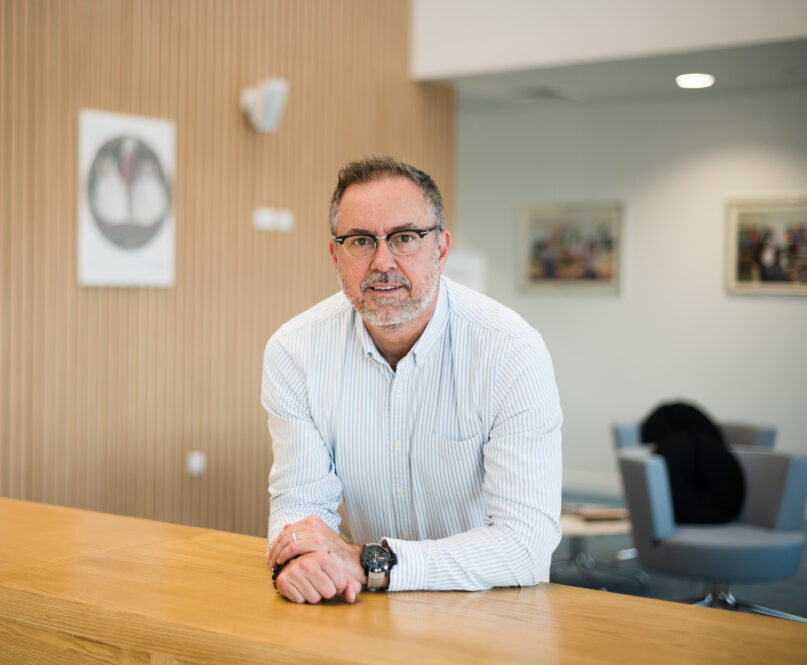Robert Cody, the Head of School at ACS Doha, has more than 20 years of experience as an educator, administrator and community collaborator. Known for closing his emails and letters with the words ‘Relentlessly Positive’, he says the practice holds him accountable to having a positive attitude.
Cody began his career teaching Middle and High School in New York and New Hampshire before serving as a High School Assistant Principal in Vermont. For three years, he implemented the renowned International Baccalaureate programme at a school in Cambodia, providing students with a recognised continuum of education to rigorously challenge their academic and personal growth.
In 2014 Cody joined ACS Doha as Deputy Head of School and went on to rise to the rank of Head of School. Under his leadership, the school has moved to a new state-of-the-art campus in Al Kheesa with outstanding facilities.
In an interaction with Education Middle East, Cody spoke about the revolutionising changes in the education sector in the past 20 years, how he promotes students’ wellbeing at school and his experience working alongside students in the surrounding communities to build homes for Habitat for Humanity and more.
Did you always want to be an educator? When did you realise this was your calling?
From as early as my teenage years, I knew that I wanted to be a teacher. I remember taking a placement test in high school that would predict possible career paths for my future. During that test, I answered as a teacher would answer to ensure that the test results would align with what I already believed would be my pathway. So when the results came in, it confirmed what I already knew; my career path was aligned in the direction of something I was genuinely passionate about.
My first full-time teaching job was in a wonderful multi-cultural community outside New York City. Being 25 years of age and working in a diverse school allowed me to become the teacher I am today. This experience changed me personally and professionally. I will be grateful forever to the students, parents and staff of the school for this experience..
What brought you to the Middle East?
My family and I grew up in America and wanted to share our experiences with people worldwide. We made our first international move out of the US, and spent four years living in the Far East amidst the Buddhist culture. After spending time in the Far East, it made sense to then travel to the Middle East and experience living in the Islamic culture. We continue to enjoy the time spent with people throughout our journey, and it’s a great learning on how as different as we may all seem, there are so much more that really bonds us in similarity.
Being the head of a school is a mixed bag of successes, challenges, failures – tell us about some of the experiences that remain firmly in your memory?
A Head of School will never forget their first high school graduation. Graduation is an exciting moment in a student’s life, and it is great to be a part of the experience.
I also remember special events like our annual International Fair. This event reminds my family and me why we journey overseas to meet people from all around the world.
In its 10-year journey till date, you’ve been with ACS Doha for almost eight years. What according to you have been the major accomplishments of the school?
I think one of our biggest accomplishments is for the continual push to increase rigor year-on-year in learning for our students, while still developing and supporting their social-emotional needs. By ensuring that their social-emotional needs are given the same if not more of a priority, we allow each student truly to reach their academic best and help them develop skills they will use in all aspects of life.
Another accomplishment was safely moving our community from the old campus to the new landmark campus during COVID. It allowed us to provide further facilities and opportunities for students to further develop their talents. With a larger campus, it enabled us to be the only school to allow all students on campus throughout the COVID restrictions while remaining aligned with the needed health and safety protocols.
Finally, I would have to say that building a solid community as ACS, where we have parents and students actively engaged throughout our journey and assisting us as we grow our student population, is one of my fondest accomplishments.
How do you promote student well-being at ACS Doha? Any tips for other educators?
One tip is to go to the experts. During COVID, ACS Doha looked to the medical field and how they could take care of their staff and their patients in this stressful time. We even visited local hospitals and spoke to doctors about thriving during this pandemic.
Having worked as an educator for the past 20 years, what in your view have been the most revolutionizing changes in the education sector?
Technology is the simple answer. It’s amazing to see how it has been integrated within all educational functions. However, it is worth mentioning that there is one thing that we have not lost that is the most revolutionary. ACS Doha is still committed to the connections and relationships with our community. As the world rapidly changes, our human connection remains critical in our growth.
I also believe neuroscience continues to have a major impact, informing our teaching and learning. We continue to learn how the brain works and can better meet and motivate students in their learning journey.
We’re told that you close your emails and letters with the words ‘Relentlessly Positive’. Why this phrase – what does it mean to you?
I have had ‘Relentless Positive’ at the end of my letters for over 20 years. When I first started to use the phrase, it was just a reminder of how I wanted to live. Then relentlessly positive became a commitment to the people I met on my learning journey. Now, through neuroscience research, our brains need to be reminded to see the positive in this world. Adding this statement to my email signature all those years ago has changed the structure of my brain and made me who I am today.
You have worked alongside students in building homes in surrounding communities for Habitat for Humanity. How was the experience?
I have been fortunate to be a part of many experiences where I could support the community in which I lived. Building houses in Cambodia was a wonderful experience for my family and I. Life can be stressful, and it was for my well-being that I tried to get involved in the community. I was a volunteer at Hospice in Colorado as my commitment to the community and for my wellness. Being trained and having the opportunity to be with people as they enter the final stage of their lives is a profound responsibility. This experience affected me so much that I plan to continue this assistance long after I retire from education.








